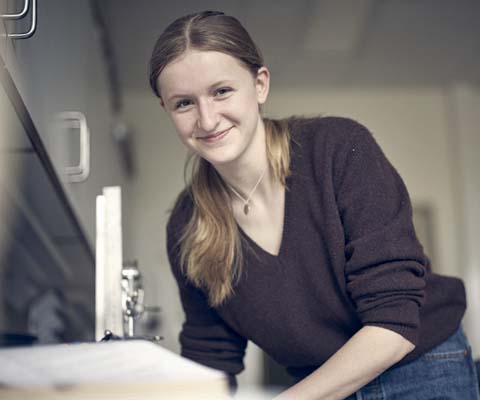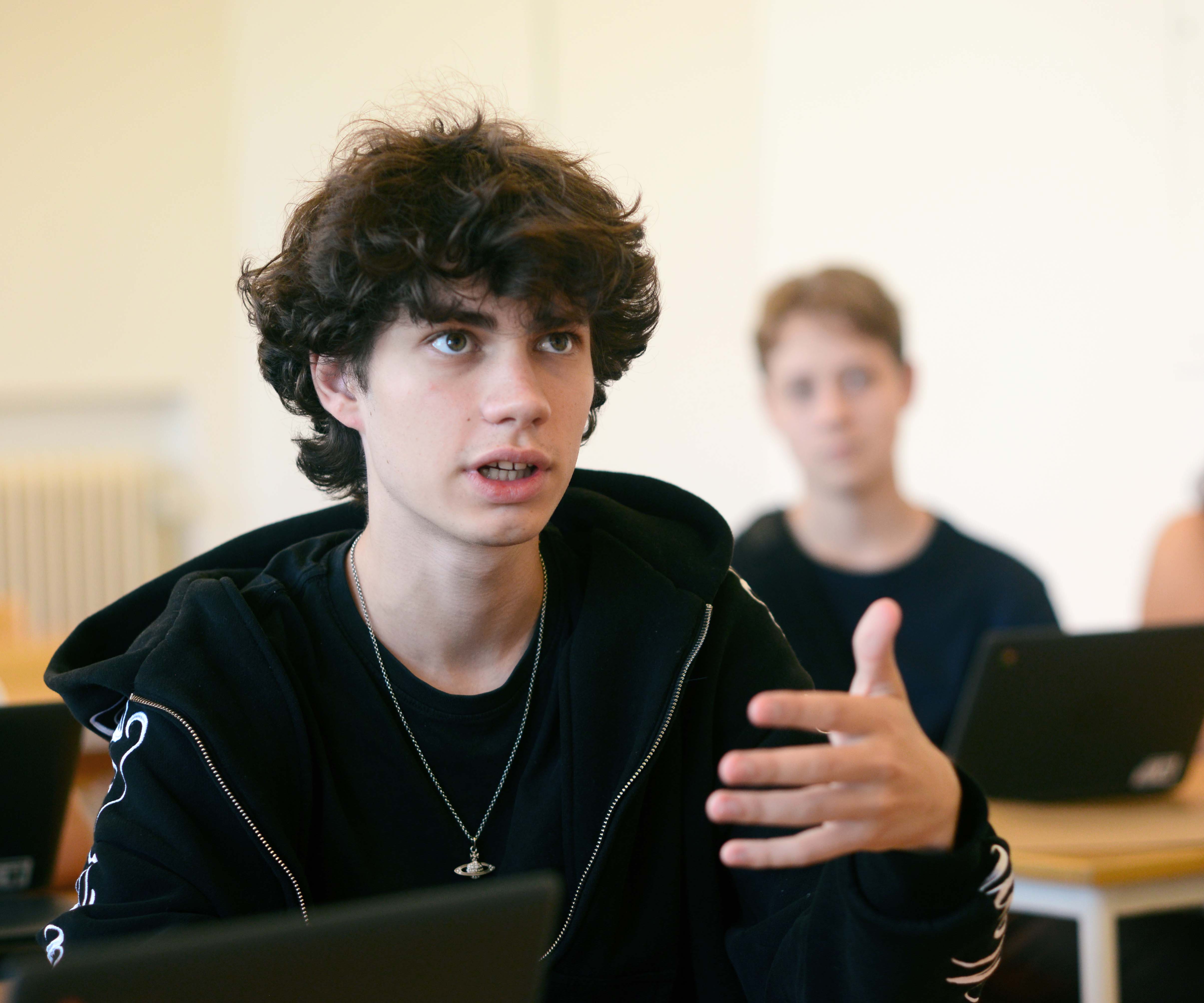Diploma Programme
Introduced in 1994, the International Baccalaureate Diploma Programme (IB-DP) at Malmö Borgarskola is one of the oldest and largest IB Diploma Programmes in Scandinavia. With an average IB Diploma score of 35 points, Malmö Borgarskola is one of the top IB-DP schools in Sweden.


The Gateway to Higher Education
and the World
The Diploma Programme (DP) is highly recognized and appreciated by all of the world’s best universities, in Sweden and internationally.
The DP at Malmö Borgarskola is an upper secondary program for academically motivated students aged 15-19 years old. As all Swedish upper secondary (gymnasieskola) programs are three years, the IB-DP starts with the Pre-DP followed by DP1 and DP2.
The vast majority of our graduates continue on to higher education, many studying at top universities such as Oxford, Cambridge, London School of Economics, Imperial College, Warwick, Edinburgh, St Andrews, Harvard, Yale, MIT, Stockholms Handelshögskola, Lund Uppsala, as well as in medical schools in Sweden and abroad.
Core elements and subjects
The Preparatory Year (Year 1)
The Pre-DP year is the same for all students and follows a course of study which is similar to the Social Science Programme in the Swedish system. This makes it possible to change to another Swedish program after the first year, if a student do not with to continue into the Diploma Programme. The teaching language is English, except for Swedish and modern language classes.
The aim of the Pre-DP is to prepare students for the methods and challenges of the diploma programme by developing many ot the academic skills seen in the ATL, as well as to help students select appropriate DP1/2 subjects.
The Pre-DP year emphasises mathematics and natural science, and provides students with necessary courses for many Swedish university programs, such as Historia, Naturkunskap 1 and 2, Moderna språk steg 3, and Samhällskunskap 1. IB grades (1-6) as well as Swedish grades (A-F) are awarded. Admission to Pre-DP is open through the City of Malmö (via the skanegy.se website). We admit 80 students into the Pre-DP.
In order to select subjects for the DP the requirements are:
- 27 points in the selected six subjects
- Grade 4 or higher for SL subjects
- Grade 5 or higher for HL subjects and Math AA SL
- Grade 6 for HL mathematics
Students make selections based on fall term grades - and need to keep grades by the end of the Pre-DP year.
Subject | Hours |
|---|---|
First language (Swedish or English) | 100 |
Foreign language (English or Swedish) | 100 |
Modern language (French, German or Spanish) | 80 |
History | 80 |
Social Sciences | 100 |
Theory of Knowledge | 20 |
Biology | 85 |
Chemistry | 55 |
Physics | 50 |
Mathematics | 115 |
Physical Education | 90 |


DP1 and DP2 (Years 2 and 3)
The Diploma Programme requires that students study subjects, three on higher level (240 hours) and three on standard level (150 hours), as well as the Diploma Core, which is made up of the following elements:
- Theory of Knowledge (TOK) - in which students reflect on the nature of knowledge and on how we know what we claim to know.
TOK is a subject which aims to train your critical thinking. Issues from the fields of Logic, Ethics and Philosophy are discussed. TOK is graded in the form of an essay that is submitted and externally assessed and an internally assessed oral presentation.
- The Extended Essay (EE) - an independent, self-directed piece of academic research.
The EE is an essay of 4,000 words in an IB subject of your choice, providing an excellent opportunity to undertake original research and learn more about a topic of special interest to you. The essay is assessed by an external examiner. - Creativity, Activity, Service (CAS) - in which students complete a project related to those three concepts.
CAS aims to let you experience the importance of life outside school. Creativity and Activity should play an equal part with Service in the CAS programme. CAS should challenge you and help you develop a spirit of discovery and self-reliance as well as encouraging new skills and interests and a sense of responsibility towards members of the community.
Grading and Graduation
The Pre-DP grade scale is 1-6, and students need to have a grade 4 in order to select a SL DP subjects, grade 5 in order to select a HL DP subject (and Math AA SL), and a grade 6 for Math HL. Students also receive Swedish grades A-F in subjects corresponding to the Swedish SA-program.
The grading scale in the DP is 1-7, and at the end of DP2 all students must sit final exams in their six subjects. Approximately 70-75% of the grade is determined by the exam results which are marked by external examiners, and about 25-30% of the grade is made up of Internal Assessments in the different subjects.
In the core elements, a candidate can be awarded a maximum of three marks. Thus, the maximum IB score is 45 points (42+3) which is awarde 0,2% of all 250,000+ IB candidates sitting exams each year. The IB world average is 29 points, the Swedish average is 30 points, and the average at Malmö Borgarskola is about 35 points.
To graduate with a diploma a candidate must achive a minimum of 24 points (including 12 points in the HL subjects), as well as pass the core elements. About 98% of the IB students at Malmö Borgarskola has graduated with a diploma.
Subjects in the Diploma Programme
Students choose courses from the following subject groups:
- Language A - Studies in Literature (Lit) and Language and Literature (LL):
English Lit and LL, Swedish Lit and LL and Self-taught (SL) - Language B - Language Acquisition:
French, Spanish, Swedish, English (HL) - Individuals and Societies:
Economics, Global Politics, History (HL) and Psychology - Sciences:
Biology, Chemistry, Physics, and Environmental Systems and Societies (SL) - Mathematics:
Mathematics Analysis and Approaches Higher and Standard level, Mathematics Application and Interpretations Standard Level - An elective from groups 1-4
Focus on Skills
The development of skills such as thinking skills and communication skills are frequently identified as crucial elements in preparing students effectively for life beyond school.
However, this is not enough to succeed in life. A 2007 survey of 400 U.S. corporate executives identified their top four requirements of new recruits as being oral and written communication skills, critical thinking/problem-solving skills, professionalism/work ethic, and collaboration skills (Trilling and Fadel 2009).
Similar skills lists have been developed by the International Society for Technology in Education (ISTE) and the Organisation for Economic Co-operation and Development (OECD), and are also the subject of numerous books such as The Global Achievement Gap (Wagner 2010). Even so, many of today’s students struggle with these basic skills of effective learning.
Approach to Learning and Teaching (ATL)
This is why the IB emphasize not only traditional cognitive skills but also the development of approaches to learning and teaching (ATL), with special focus on skills in relation to communication, thought, self-management, research and social interactions.
Moreover, the IB also stresses the importance of affective and metacognitive skills, and about encouraging students to view learning as something that they “do for themselves in a proactive way, rather than as a covert event that happens to them in reaction to teaching” (Zimmerman 2000: 65).
All of the above make up the IB Learner Profile which are important attributes for candidates to become “self-regulated learners” (Kaplan 1998). Self-regulated learners can set achievable goals, pose relevant questions, reflect on their own learning, and make changes to their learning processes when and where necessary (Zimmerman and Schunk 1989, de Bruin et al. 2011, Wolters 2011).
Cognitive Skills
The term “skill” is therefore used in a broad sense in the DP to encompass cognitive, metacognitive and affective skills. Cognitive skills include all the information-processing and thinking skills, often called “study skills” in a school environment.
Affective skills are the skills of behavioural and emotional management underpinning factors such as resilience, perseverance and self-motivation, which often have a large role to play in educational achievement.
Metacognitive skills are the skills that students can use to monitor the effectiveness of their learning skills and processes, to better understand and evaluate their learning.
In the DP, as well as in the Primary Years Programme (PYP) and Middle Years Programme (MYP), these cognitive, metacognitive and affective skills are grouped into the same five ATL categories.
The IB Learner Profile and ATL
Although these skills areas are presented as distinct categories, there are obviously close links and areas of overlap between them, and it is intended that these categories should be seen as interrelated.
It is also the intention that these ATL skills should be seen as linking closely with the attitudes and dispositions identified in the IB learner profile.
The learner profile is the IB mission statement translated into a set of learning outcomes for the 21st century. It is an easily communicated set of ideals that can inspire, motivate and focus the work of schools and teachers, uniting them in a common purpose.
